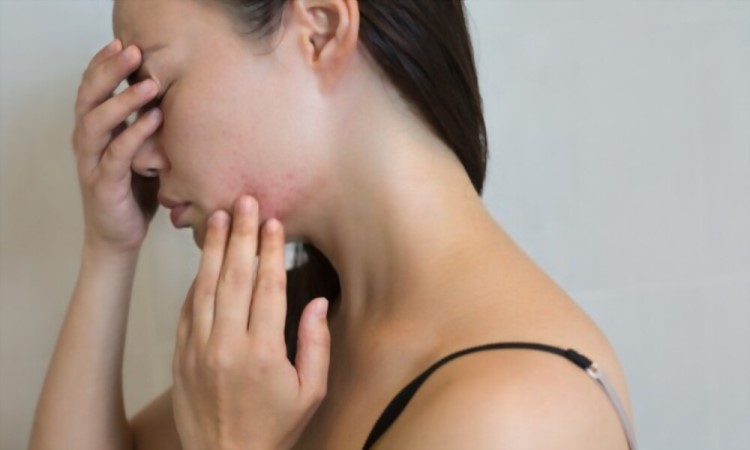After having a baby, women may anticipate a number of things, such as sleep deprivation, afterpains, breastfeeding, bleeding, and stretch marks. But they may not anticipate acne outbreaks and deal with pimples. A face covered in zits is quite annoying. Acne can be a problem not only during puberty but also during pregnancy and in the postpartum period. Let’s understand postpartum acne in detail.
Where Is Postpartum Acne Often Found?
It is possible to develop postpartum acne in any area of the body, including the back and buttocks. But since the sebaceous glands are more densely packed on the face (cheeks, forehead, and chin), acne is more likely to manifest there.
What Causes Postpartum Acne?
Hormones are the single most important factor in explaining postpartum acne. While carrying a child, the mother’s body undergoes dramatic changes due to the surge of hormones. The largest organ, the skin, is also impacted by pregnancy hormones. That’s why expectant mothers are more likely to experience acne, skin pigmentation, and other problems.
In most cases, the acne that develops during pregnancy due to this change in hormone levels clears up once the baby is born. Postpartum acne occurs when acne persists after childbirth and pimples continue to develop. There are some women who experience acne after giving birth despite not experiencing breakouts during pregnancy.
Related Reading: 12 Permanent Body Changes After Pregnancy That Women Experience
Other reasons that trigger hormonal acne after having a baby are:
· Stress
There are multiple ways in which stress can bring on or exacerbate acne. Increases in both stress and acne severity were found to be strongly correlated with one another1. Acne isn’t directly caused by stress, but persistent stress makes your body release a lot of cortisol, a stress hormone. Sebaceous glands respond to elevated cortisol levels by producing more sebum, which can block pores and lead to acne.
· Lack Of Sleep
According to research, sleep deprivation can cause acne. Acne is more likely to occur in people who report poor sleep quality. Not getting enough sleep can also significantly increase one’s cortisol levels. This increase in cortisol may have a detrimental effect on the health of your skin.
The presence of fatigue upon waking up is another factor that fosters the development of acne2. Thus, acne flare-ups are common in the postpartum period when mothers are often exhausted and neglect their own nutrition in favor of caring for their newborns.
· Dehydration

Insufficient water intake causes dehydration. It has a drying effect on the skin. Dehydrated skin, characterized by an overly dry appearance, is a common symptom of inadequate water intake. It differs greatly from dry skin, which lacks both water and oil3.
Dehydration can cause postpartum breakouts. When the skin is dehydrated, the sebaceous glands produce more oil, which can result in acne breakouts. Breastfeeding, along with inadequate water intake, contributes to postpartum acne.
Furthermore, dry skin may become more porous to bacteria, making the skin more prone to inflammation, infection, and changes such as acne. This could trigger/ flare up pimples on her face.
· Breastfeeding
Breastfeeding can be a contributing factor to acne, even though it does not cause acne by itself. Due to the fact that new mothers’ hormone levels do not return to normal until after breastfeeding, breastfeeding can also prolong the persistence of acne.
Related Reading: 9 Early Warning Signs Of Postpartum Depression To Watch Out For
How Long Does Postpartum Acne Last?
It’s possible that your acne will clear up almost immediately after you give birth. On the other hand, some people’s acne doesn’t clear up for weeks or months. The duration of postpartum acne is largely determined by how long it takes for hormone levels to return to normal.
8 Home Remedies For Postpartum Acne
The choice of treatment for postpartum acne can depend on whether the mother is breastfeeding. If you aren’t breastfeeding, you can use any acne medication (oral or topical) safely and effectively.
On the other hand, when selecting a medication to treat acne while breastfeeding, you should proceed with the same degree of caution that you did when selecting a medication to take while pregnant. Treating postpartum acne is tricky, particularly for women who are breastfeeding. There are a variety of medications that have the potential to enter breast milk.
Here are eight effective home remedies for acne after pregnancy:
1. Breastmilk
Lauric acid, which is found in breast milk, has antibacterial and acne-fighting properties. You can get rid of postpartum pimplesby dabbing the affected area with breast milk or a mixture of breast milk and coconut oil (coconut oil is another source of lauric acid) and then allowing it to dry naturally4.
2. Apply tea tree oil
Tea tree oil is a natural antibacterial and anti-inflammatory, which means that it might kill the bacteria that cause acne. Because of its anti-inflammatory properties, tea tree oil can also be used to lessen the appearance of redness and swelling associated with acne5.
Some people are allergic to tea tree oil, so it’s recommended to use products with a concentration of less than 5% to avoid the risk of skin irritation6. 1 to 2 drops of tea tree oil should be mixed with 12 drops of carrier oil. Apply it morning and evening. It is always best to perform a patch test before applying it to the affected area.
3. Aloe vera
Aloe vera is a well-known home remedy for numerous skin conditions. Its antibacterial, anti-inflammatory and soothing properties help reduce acne’s tenderness and pain7. Aloe vera cannot cure acne on its own, but it can enhance the efficacy of anti-acne medications by increasing blood circulation to the affected area. Use either homemade aloe gel extracted from an aloe plant or organic aloe gel purchased from a pharmacy. However, you should check that the aloe gel you purchase is fragrance- and comedogen-free before using it.
4. Green tea
Catechins, a type of polyphenol antioxidant, are abundant in green tea. It is a very effective home remedy for acne8. Antioxidants aid in the breakdown of toxins and waste products that can harm healthy cells. Acne can occur when there is an excess of sebum in the pores and insufficient antioxidants in the body. Green tea can be consumed or green tea extract can be applied topically. Green tea extract can be purchased from health stores or online.
Related Reading: Can I Drink Green Tea During Pregnancy?
5. Cucumber face mask

The cooling and moisturizing properties of cucumbers may help reduce the redness and irritation of acne-prone skin. Mix one cup of oatmeal with one small cucumber to make a paste. Combine 1 teaspoon of this paste with 1 teaspoon of yogurt and apply to the face. After letting it sit for half an hour, rinse it off with plenty of water.
6. Turmeric
Indian brides typically use a turmeric mask to ensure flawless skin on their wedding day. Turmeric has anti-inflammatory and antioxidant properties. As a result, this spice can help alleviate the severity of skin conditions like acne and restore the skin’s natural radiance.
Combine one teaspoon of turmeric powder with half a teaspoon of lemon juice. Apply the paste directly to the acne. For best results, let it sit for 15 minutes before rinsing with cold water and gently drying with face towels.
Mix half a teaspoon of turmeric powder with two to three teaspoons of plain Greek yogurt. Add a few drops of natural honey. It is a simple and effective turmeric facial mask for reducing acne.
7. Rosemary
Chemicals and compounds in rosemary extract (also known as Rosmarinus officinalis) have antioxidant, antibacterial, and anti-inflammatory effects. Evidence suggests that rosemary extract can inhibit acne-causing bacteria and lessen inflammation9.
8. Steps to take
Certain steps, in addition to the home remedies, must be taken for the remedies to work quickly and eliminate acne. Therefore,
- Makeup and skincare products should be noncomedogenic, meaning they won’t cause pores to become clogged. Most products will have this information listed on the label, or you can search online
- Take in plenty of fluids
- It’s important to wash your face twice a day with a mild cleanser and to always remove your makeup before going to bed
- Select gentle cleansers and facial washes to lessen the likelihood of acne breakouts
- Don’t ever pop pimples! Acne sores can become infected even more quickly if you touch, rub, squeeze, or pop them
- Take measures to reduce stress
- Include lots of fruits and vegetables in your diet
Treating Postpartum Acne If Not Breastfeeding
If you aren’t breastfeeding and your postpartum acne has reached a severe stage, you can try one of several effective topical applications or oral medications. Topical applications comprise topical antibiotics, azelaic acid, retinoids, and salicylic acid.
Many of these topical applications are safe during breastfeeding as well. However, retinoids are not safe for breastfeeding mothers.
Be cautious when attempting to treat acne on the chest, even with topical treatments that are known to be safe. Don’t apply topical acne medications to the areas where they could pass to your baby.
And for mothers who aren’t breastfeeding, a doctor might recommend oral prescription drugs. This includes oral antibiotics, birth control pills, and anti-androgen agents.
When to Worry About Postpartum Acne?
The situation must be addressed by a doctor if you feel it is getting out of control and that prescription medication is needed. If you experience any of the following symptoms, you need to see a doctor immediately.
- Postpartum acne that doesn’t improve with self-care
- The zits are painful and red
- Acne pops up on the weirdest sites
- Stretching over a wide area of the body
- Causing psychological suffering
Conclusion

The postpartum period is well-known for being challenging for mothers. Not only do they deal with soiled diapers and restless nights, but they also deal with raging hormones. They have to deal with dirty diapers, sleepless nights, and the side effects of surging hormones. Hormonal imbalances can lead to a variety of negative outcomes, from acne to postpartum depression. When the skin is ravaged by cystic acne, it can cause worry. The good news is that it won’t last forever, and the home remedies we talked about will help you get rid of the problem for good.
FAQs
Some people believe that pizza and chocolate are to blame for their acne problems, but there is little evidence to support this theory.
However, some people’s digestive systems are sensitive. An overall high-carbohydrate or high-sugar diet may cause an inflammatory response in them, and acne will be one of its side effects.
Having acne does not necessarily mean that you have to give up wearing makeup entirely. Applying a little bit of makeup probably won’t aggravate acne.
However, exercise caution when selecting cosmetic products. Make sure the makeup you use is non-comedogenic. You should use a mild cleanser to wash your face twice daily, and again after you’ve been sweating.
Always wash your face thoroughly before going to bed, removing all traces of makeup.

